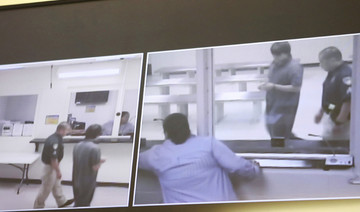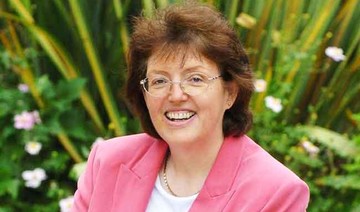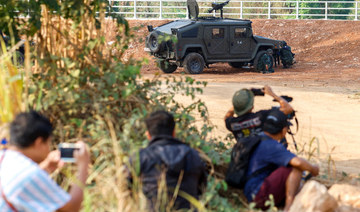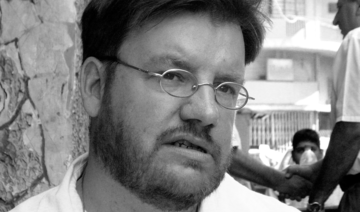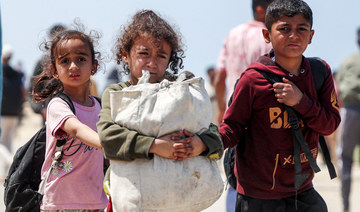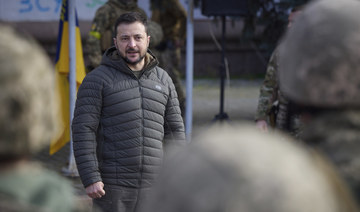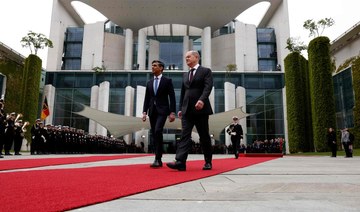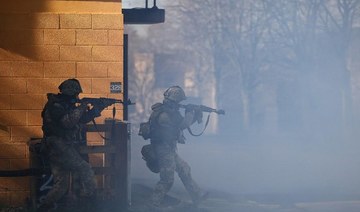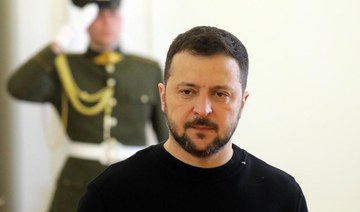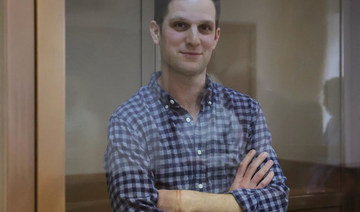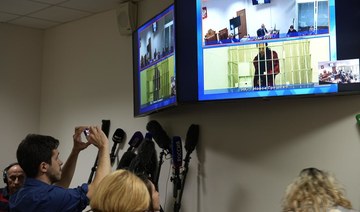MUNICH: A German court on Wednesday found the main defendant in a high-profile neo-Nazi trial guilty over the killing of 10 people — most of them migrants — who were gunned down between 2000 and 2007 in a case that shocked Germany and prompted accusations of institutional racism in the country’s security agencies.
Judges sentenced Beate Zschaepe to life in prison for murder, membership of a terrorist organization, bomb attacks that injured dozens and several lesser crimes including a string of robberies. Four men were found guilty of supporting the group in various ways and sentenced to prison terms of between 2½ and 10 years.
Presiding judge Manfred Goetzl told a packed Munich courtroom that Zschaepe’s guilt weighed particularly heavily, meaning she is likely to serve at least a 15-year sentence. Her lawyers plan to appeal the verdict.
The 43-year-old showed no emotion as Goetzl read out her sentence. A number of far-right activists attending the trial clapped when one the co-accused, Andre Eminger, received a lower sentence than expected.
Zschaepe was arrested in 2011, shortly after her two accomplices were found dead in an apparent murder-suicide. Together with the men, Uwe Mundlos and Uwe Boehnhardt, she had formed the National Socialist Underground, a group that pursued an ideology of white racial supremacy by targeting migrants, mostly of Turkish origin.
Goetzl said the trio agreed in late 1998 to kill people “for anti-Semitic or other racist motivations” in order to intimidate ethnic minorities and portray the state as impotent.
They planned to wait until they had committed a series of killings before revealing their responsibility, in order to increase the public impact of their crimes.
Goetzl said Zschaepe’s contribution was “essential for carrying out the robberies and attacks,” which couldn’t have happened without her.
Known by its acronym NSU, the group evaded arrest for almost 14 years, thanks to a network of supporters and repeated mistakes by German security agencies.
Anti-migrant sentiment that underpinned the group’s ideology was particularly strong in eastern Germany during the early 1990s, when Mundlos, Boehnhardt and Zschaepe were in their late teens and early 20s. The period saw a string of attacks against migrants and the rise of far-right parties.
Anti-racism campaigners have drawn parallels between that period and the violence directed toward asylum-seekers in Germany in recent years, which has seen the emergence of the far-right Alternative for Germany party.
The case against Zschaepe hinged heavily on the question of whether judges would hold her equally as culpable for the killings as her two dead accomplices, even though there was no evidence she had been physically present during the attacks.
Her lawyers sought to portray Zschaepe as a naive woman who played no active role in the killings, bomb attacks and bank robberies committed by Mundlos and Boehnhardt. Zschaepe rarely spoke during the five-year trial, refusing to answer questions from lawyers representing the victims’ families. Toward the end, she expressed regret for the families’ loss and described herself as “morally guilty” but urged the court not to convict her “for something that I neither wanted nor did.”
The NSU case has already become a firm part of German popular culture, serving as the basis for books, a Golden Globe-winning film and a Netflix series.
Still, Barbara John, the government’s ombudswoman for the victims’ families, said many in Germany don’t want to know the details of the case.
“That’s true, too, for immigrants who want to protect themselves psychologically from the knowledge that they live in a country which couldn’t protect them,” she told The Associated Press.
Speaking ahead of the verdict, John said the trial could help send a signal not just to far-right extremists but also to the country’s security agencies, which for years failed to consider a possible far-right motive in the 10 killings and two bomb attacks that took place across the country. Instead, police focused on whether the victims had ties to organized crime — a line of investigation for which there was never any evidence.
Germany’s interior minister, Horst Seehofer, welcomed the verdict and said that “the crimes should be a lesson and a task for us to fight far right extremism in Germany with all means needed, preventively and repressively, in the future as well.”
Families of the victims said Tuesday that the suspicion directed toward their loved-ones shook their faith in the German justice system.
“The investigation went in the wrong direction, not due to the failure of individuals but due to institutional racism,” said Alexander Hoffmann, a lawyer representing victims of a 2004 bomb attack in Cologne.
He urged federal prosecutors to continue investigating the NSU’s wider network of supporters, believed to be much broader than the four men on trial with Zschaepe.
John, the ombudswoman, said there are encouraging signs that police and intelligence agencies are beginning to listen to minorities and make an effort to recruit them, ending the long-maintained illusion that Germany isn’t a country of immigrants.
“One big question remains: Do we in Germany really want to know why and how the NSU murders occurred?” she said. “If that were the case, the work of politicians and civil society needs to continue.”
German suspect in neo-Nazi migrant targeting gang found guilty of 10 killings
German suspect in neo-Nazi migrant targeting gang found guilty of 10 killings
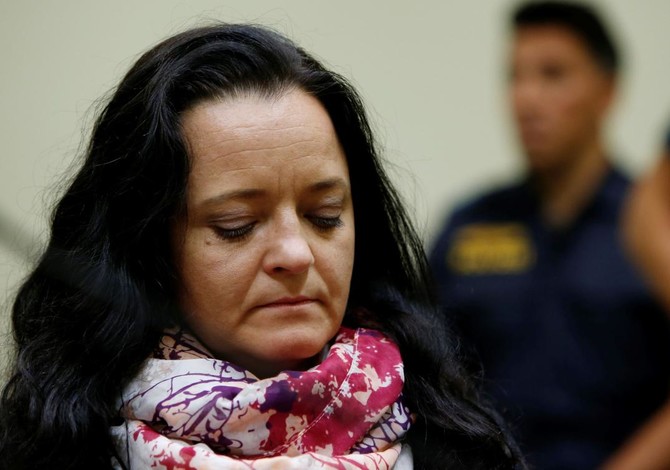
- Beate Zschaepe was sentenced to life in prison for murder, membership of a terrorist organization, bomb attacks that injured dozens and several lesser crimes including a string of robberies
- She had formed the National Socialist Underground, a group that pursued an ideology of white racial supremacy by targeting migrants, mostly of Turkish origin
Myanmar rebel group withdraws troops from key town on Thai border
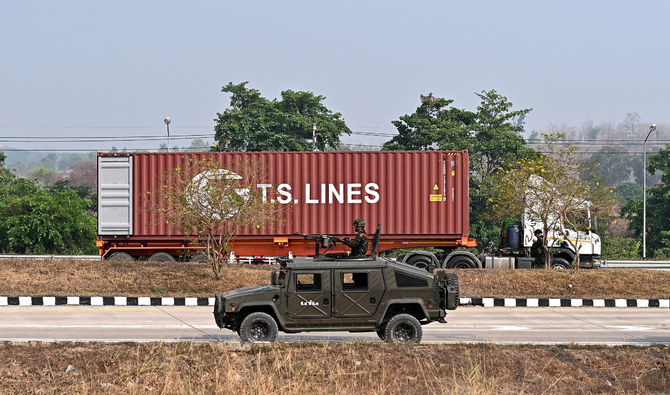
MYANMAR: A Myanmar rebel group has withdrawn its troops from a town along the Thai border following a counteroffensive by soldiers of the ruling junta from whom the resistance fighters had wrested the key trading post this month, an official said on Wednesday.
The Karen National Union made a “temporary retreat” from the town of Myawaddy, a spokesperson said, after the return of junta soldiers to the vital strategic area that is a conduit for annual foreign trade of more than $1 billion.
“KNLA troops will ... destroy the junta troops and their back-up troops who marched to Myawaddy,” said Saw Taw Nee, referring to the group’s armed wing, the Karen National Liberation Army, one of Myanmar’s oldest ethnic fighting forces.
He did not say what its next move would be, however.
Fighting had flared as recently as Saturday in Myawaddy, forcing 3,000 civilians to flee in a single day as rebels fought to flush out stranded Myanmar government troops holed up at a border bridge crossing.
On Wednesday, Thailand said the fighting had eased and it hoped to re-open its border crossing as trade had been hit. It said most civilians had returned and 650 remained.
“The situation has improved significantly,” spokesperson Nikorndej Balankura told a briefing. “Nevertheless, we are closely monitoring the situation, which is highly uncertain and can change.”
Thailand has received reports that negotiations may be starting between rival groups on the Myanmar side, Nikorndej said, without elaborating.
He added that Thailand had proposed to Laos, the chair of the Association of Southeast Asian Nations, that it could host a meeting seeking to end the Myanmar crisis.
Columbia University extends talks with students, averting police action
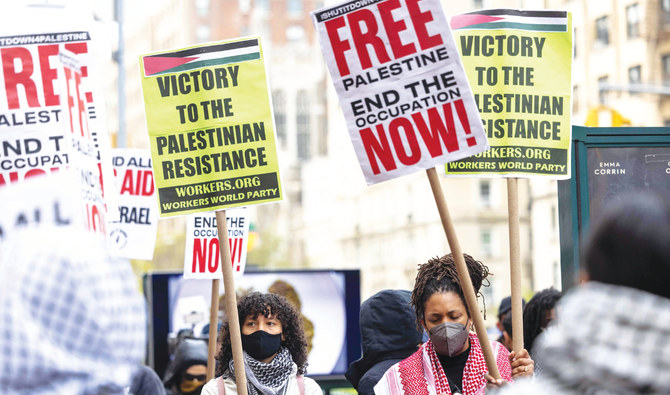
- Standoffs persist at other universities across US, including California State Polytechnic, Humboldt
NEW YORK/JERUSALEM: Columbia University averted another confrontation between students and police on Wednesday, but the situation remained tense with campus officials saying it would continue talks with pro-Palestinian protesters for another 48 hours.
University President Minouche Shafik had set a midnight deadline to reach an agreement on clearing an encampment of protesters on campus but the school extended negotiations, saying it was making “important progress.”
Student protesters had committed to dismantling and removing a significant number of tents, the New York Ivy League university said in a statement.
On Wednesday morning, the encampment appeared calm and a little smaller than the previous day.
Standoffs also persisted at other universities across the country, including California State Polytechnic University, Humboldt, where protesters this week used furniture, tents, chains and zip ties to block a building’s entrance and barricade themselves inside.
And new student encampments continued to pop up, including at Brown University in Rhode Island.
Police first tried to clear the encampment at Columbia last week, when they arrested more than 100 protesters. But the move backfired, acting as an inspiration for other students across the country to set up similar encampments and motivating protesters at Columbia to regroup.
Students protesting Israel’s war with Hamas are demanding schools cut financial ties to Israel and divest from companies enabling its monthslong conflict.
Dozens have been arrested on charges of trespassing or disorderly conduct. Some Jewish students say the protests have veered into antisemitism and made them afraid to set foot on campus.
The reprieve at Columbia came hours before Republican US House Speaker Mike Johnson planned to visit and meet with Jewish students to address antisemitism on college campuses.
Columbia said it had agreed with protest representatives that only students would remain at the encampment and they would make it welcoming, banning discriminatory or harassing language.
Elsewhere, at the University of Minnesota, Democratic US Rep. Ilhan Omar attended a protest late on Tuesday, hours after nine protesters were arrested on the campus when police took down an encampment in front of the library.
Hundreds had rallied in the afternoon to demand their release.
Omar’s daughter was among the demonstrators arrested at Columbia last week.
Also on Tuesday, police arrested more than 200 protesters blocking traffic in Brooklyn, near the home of Sen. Chuck Schumer, during a non-college demonstration demanding a permanent ceasefire in Gaza The protest was organized by Jewish Voice for Peace on the second night of Passover.
At Cal Poly Humboldt, protesters chanted, “We are not afraid of you!” before officers in riot gear pushed into them at the building’s entrance, video shows.
Three students were arrested, according to a statement from the school, which shut down the campus through Wednesday. Students had occupied a second campus building Tuesday.
Students at some protests were hiding their identities. At an encampment of about 40 tents at the heart of the University of Michigan’s campus in Ann Arbor, almost every student wore a mask, which was handed to them when they entered.
At New York University this week, police said 133 protesters were taken into custody and all had been released with summonses to appear in court on disorderly conduct charges.
More than 40 protesters were arrested Monday at an encampment at Yale University.
Harvard University in Massachusetts has tried to stay a step ahead of protests by locking most gates into its famous Harvard Yard and limiting access to those with school identification.
Meanwhile, Hamas published a video apparently showing Hersh Goldberg-Polin, an Israeli-American seized during the Oct. 7 attack on Israel and taken hostage into Gaza, alive.
The short video, which is undated, showed the 23 year-old missing his lower arm, which was blown off during the Hamas-led attack in October, but otherwise apparently healthy.
His mother Rachel Goldberg-Polin has been campaigning actively for the release of her son, who was abducted at the Nova music festival that was attacked by Hamas gunmen on Oct. 7 and is one of 133 Israeli hostages still in captivity after over 100 were freed.
Ukraine uses long-range missiles secretly provided by US to hit Russian-held areas, officials say
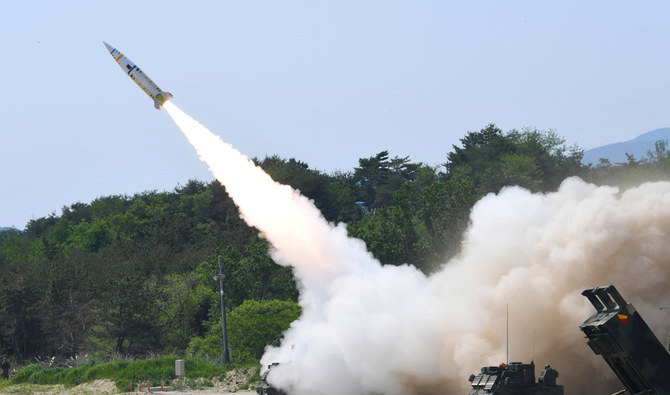
- The new missiles give Ukraine nearly double the striking distance up to 300 kilometers
- The two US officials would not provide the exact number of missiles given last month or in the latest aid package, which totals about $1 billion
WASHINGTON: Ukraine for the first time has begun using long-range ballistic missiles provided secretly by the United States, bombing a Russian military airfield in Crimea last week and Russian forces in another occupied area overnight, American officials said Wednesday.
Long sought by Ukrainian leaders, the new missiles give Ukraine nearly double the striking distance — up to 300 kilometers (190 miles) — that it had with the mid-range version of the weapon that it received from the US last October. One of the officials said the US is providing more of these missiles in a new military aid package signed by President Joe Biden on Wednesday.
Biden approved delivery of the long-range Army Tactical Missile System, known as ATACMS, in February, and then in March the US included a “significant” number of them in a $300 million aid package announced, one official said.
The two US officials, who spoke on condition of anonymity to discuss the delivery before it became public, would not provide the exact number of missiles given last month or in the latest aid package, which totals about $1 billion.
Ukraine has been forced to ration its weapons and is facing increasing Russian attacks. Ukraine had been begging for the long-range system because the missiles provide a critical ability to strike Russian targets that are farther away, allowing Ukrainian forces to stay safely out of range.
Information about the delivery was kept so quiet that lawmakers and others in recent days have been demanding that the US send the weapons — not knowing they were already in Ukraine.
For months, the US resisted sending Ukraine the long-range missiles out of concern that Kyiv could use them to hit deep into Russian territory, enraging Moscow and escalating the conflict. That was a key reason the administration sent the mid-range version, with a range of about 160 kilometers (roughly 100 miles), in October instead.
Adm. Christopher Grady, vice chairman of the Joint Chiefs of Staff, said Wednesday that the White House and military planners looked carefully at the risks of providing long-range fires to Ukraine and determined that the time was right to provide them now.
He told The Associated Press in an interview that long-range weapons will help Ukraine take out Russian logistics nodes and troop concentrations that are not on the front lines. Grady declined to identify what specific weapons were being provided but said they will be “very disruptive if used properly, and I’m confident they will be.”
Like many of the other sophisticated weapons systems provided to Ukraine, the administration weighed whether their use would risk further escalating the conflict. The administration is continuing to make clear that the weapons cannot be used to hit targets in Russia — only those inside Ukrainian territory, according to one of the US officials.
“I think the time is right, and the boss (Biden) made the decision the time is right to provide these based on where the fight is right now,” Grady said Wednesday. “I think it was a very well considered decision, and we really wrung it out — but again, any time you introduce a new system, any change — into a battlefield, you have to think through the escalatory nature of it.”
Ukrainian officials haven’t publicly acknowledged the receipt or use of long-range ATACMS. But in thanking Congress for passing the new aid bill Tuesday, Ukrainian President Volodymyr Zelensky noted on the social platform X that “Ukraine’s long-range capabilities, artillery and air defense are extremely important tools for the quick restoration of a just peace.”
One of the US officials said the Biden administration warned Russia last year that if Moscow acquired and used long-range ballistic missiles in Ukraine, Washington would provide the same capability to Kyiv.
Russia got some of those weapons from North Korea and has used them on the battlefield in Ukraine, said the official, prompting the Biden administration to greenlight the new long-range missiles.
The US had refused to confirm that the long-range missiles were given to Ukraine until they were actually used on the battlefield and Kyiv leaders approved the public release. One official said the weapons were used early last week to strike the airfield in Dzhankoi, a city in Crimea, a peninsula that Russia seized from Ukraine in 2014. They were used again overnight east of the occupied city of Berdyansk.
Videos on social media last week showed the explosions at the military airfield, but officials at the time would not confirm it was the ATACMS.
Ukraine’s first use of the weapon came as political gridlock in Congress had delayed approval of a $95 billion foreign aid package for months, including funding for Ukraine, Israel and other allies. Facing acute shortages of artillery and air defense systems, Ukraine has been rationing its munitions as US funding was delayed.
With the war now in its third year, Russia used the delay in US weapons deliveries and its own edge in firepower and personnel to step up attacks across eastern Ukraine. It has increasingly used satellite-guided gliding bombs — dropped from planes from a safe distance — to pummel Ukrainian forces beset by a shortage of troops and ammunition.
The mid-range missiles provided last year, and some of the long-range ones sent more recently, carry cluster munitions that open in the air when fired, releasing hundreds of bomblets rather than a single warhead. Others sent recently have a single warhead.
One critical factor in the March decision to send the weapons was the US Army’s ability to begin replacing the older ATACMS. The Army is now buying the Precision Strike Missile, so is more comfortable taking ATACMS off the shelves to provide to Ukraine, the official said.
Anger among Ukrainians in Poland as Kyiv halts passport renewals

- “Staying abroad does not relieve a citizen of his or her duties to the homeland,” Kuleba posted on social media
- The agency issuing passports to Ukrainian residents in Warsaw blamed a “technical error” for the problems, not the new directive from Kyiv
WARSAW: Hundreds of Ukrainians crammed up against a closed passport office in Warsaw on Wednesday, furious over Kyiv’s suspension of consular services for fighting-aged men in a bid to force them to return home and bolster troop numbers.
Ukrainian authorities said Tuesday that they were “temporarily” blocking men aged 18 to 60 from accessing consular services, after Foreign Minister Dmytro Kuleba said they were letting compatriots fight in their place on the front lines.
“Staying abroad does not relieve a citizen of his or her duties to the homeland,” Kuleba posted on social media.
The move is seen as part of Kyiv’s efforts to reinforce its army as soldiers struggle to hold positions against Russia.
But in Poland, which hosts hundreds of thousands of Ukrainians — both refugees from the conflict and those who were already living in the country when Russia invaded — there was anger among those who felt they were being unfairly targeted.
“This is a fight against people who are fleeing the army,” said Maksym, a 38-year-old truck driver, one of dozens of people who had come hoping to collect a new passport they had applied for — so far unsuccessfully.
“We are not asked on what grounds we went abroad... Why am I a draft dodger if I went abroad legally?” he told AFP.
Some said they had spent the whole night queueing up.
The agency issuing passports to Ukrainian residents in Warsaw blamed a “technical error” for the problems, not the new directive from Kyiv.
A heated argument broke out at the passport office when women accused a group of men of blocking the entrance and stopping other people who wanted to submit applications.
Pavlo Lyashenko, a 35-year-old entrepreneur standing nearby as the scene unfolded, told AFP that “The state has put me in a situation in which I have no way out.”
He said he had received a text message saying his passport was ready, but believed it was now being withheld from him.
“The doors are blocked. They are afraid that if I come inside, I will not leave until I receive my passport. I know it’s there,” Lyashenko said.
As the crowds swelled through the morning, the agency called in the Polish police as a precaution. Officers spoke with those queueing up, but did not otherwise intervene.
Diana Petrenko, deputy director of the Warsaw passport office, insisted that technical issues were to blame.
“Unfortunately, the documents are not issued due to technical reasons,” she told AFP, refusing to elaborate on the nature of the alleged glitch.
Ukraine’s foreign ministry said Tuesday that the suspension applied only to new applications and that any requests submitted before then would be honored.
Lyashenko, the entrepreneur, who said he had left Ukraine long before the start of the war, said he worried he could end up in a legal grey zone, abroad but without a valid passport.
“I think that our state is simply driving people to the point that we will all need to do this,” he said.
Although there are some exceptions, most Ukrainian men have been barred from leaving the country since Russia invaded in February 2022 — meaning that many who will now be unable to submit new passport applications had already been living away for years.
According to Ukrainian media, hundreds of thousands of working-age men have sought refuge in EU countries since the start of the war.
The consular service suspensions, which come as Kyiv scrambles to recruit troops, is widely seen as an attempt to force fighting-age men back to Ukraine.
President Volodymyr Zelensky’s government also recently passed a new mobilization law designed to help lift army numbers, and lowered the age limit for mobilization to 25 from 27.
The mobilization law, due to come into force mid-May, also toughens penalties against draft dodgers and forces men to keep their military registration up to date.
The foreign ministry said the suspension of consular services was a temporary measure needed to “resolve technical issues” linked with the implementation of the new law.
Bogdan, a Ukrainian truck driver who declined to give his full name, said he was stuck waiting for a second day straight at the Warsaw passport office.
“I drove 700 kilometers (435 miles) to get my passport because I received a text message that I could pick it up,” the 27-year-old said.
“No one gives the passport. What are our next steps?” he said. “What do we have to do to simply be given our documents that we paid for?“
A Russian deputy defense minister is ordered jailed pending trial on bribery charges
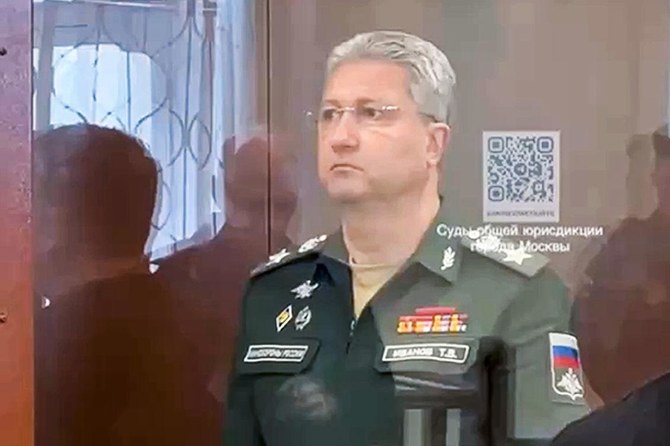
- Timur Ivanov, one of 12 deputy defense ministers, appeared in Moscow’s Basmany court Wednesday wearing his military uniform
- The committee gave no further information, apart from saying Ivanov is suspected of taking an especially large bribe — an offense punishable by up to 15 years in prison
MOSCOW: A Russian deputy defense minister in charge of military construction projects and accused of living a lavish lifestyle was ordered jailed Wednesday pending an investigation and trial on charges of bribery, court officials said in a statement.
Timur Ivanov, one of 12 deputy defense ministers, appeared in Moscow’s Basmany court Wednesday wearing his military uniform. The ally of Defense Minister Sergei Shoigu was arrested Tuesday evening, Russia’s Investigative Committee said in a statement.
The committee gave no further information, apart from saying Ivanov is suspected of taking an especially large bribe — an offense punishable by up to 15 years in prison.
The Kremlin rejected some Russian media reports that Ivanov was suspected of treason.
Ivanov, 48, was sanctioned by both the United States and European Union in 2022 after Russia’s full-scale invasion of Ukraine.
According to a court statement, investigators told the judge that Ivanov had conspired with third parties to receive a bribe in the form of unspecified property services “during contracting and subcontracting work for the needs of the Ministry of Defense.”
An acquaintance of Ivanov’s, identified as Sergei Borodin, also was arrested and ordered jailed pending an investigation and trial on the same charges, court officials said. Both men are to remain in custody until at least June 23.
According to the Defense Ministry’s website, Ivanov was appointed in 2016 by a presidential decree. He oversaw property management, housing and medical support for the military, as well as construction projects.
Russia’s state news agency RIA Novosti quoted Kremlin spokesman Dmitry Peskov as saying that Shoigu and President Vladimir Putin were informed of Ivanov’s arrest, which comes as Moscow’s war in Ukraine grinds through its third year.
Peskov dismissed Russian media reports that the corruption allegations against Ivanov were intended to obscure additional allegations of high treason.
Independent Russian news outlet reported that the bribery charges were intended to hide more serious charges of treason and avoid scandal, citing two unidentified sources close to the Federal Security Service, or FSB.
Peskov described the reports as speculation. “There are a lot of rumors. We need to rely on official information,” he told journalists.
Ivanov’s lawyer also denied any other charges, telling RIA Novosti that he faced only bribery allegations.
Before his arrest, Ivanov was seen attending a meeting with Shoigu and other military brass.
Russian media reported that he oversaw some of the construction in Mariupol — a Ukrainian port city that was devastated by bombardment and occupied by Russian forces early in the war.
Zvezda, the official TV channel of the Russian military, reported in summer 2022 that the ministry was building an entire residential block in Mariupol and showed Ivanov inspecting construction sites and newly erected residential buildings.
That same year, the team of the late Alexei Navalny, Russia’s most prominent opposition leader and anti-corruption campaigner, alleged Ivanov and his family had been enjoying luxurious trips abroad, lavish parties and owning elite real estate. The activists also alleged that Ivanov’s wife, Svetlana, divorced him in 2022 to avoid sanctions and continued living a lavish lifestyle.
Commenting on Ivanov’s case, Navalny’s ally Maria Pevchikh said on social platform X: “It’s a good day today.”
The prosecution of high-level officials for corruption remains relatively rare in Russia.
The most recent arrest in April 2023 saw former Deputy Culture Minister Olga Yarilova charged with embezzling more than 200 million rubles ($2.2 million). Yarilova, who held her post between 2018 and 2022, is on trial and facing a seven-year jail term.
Former Economics Minister Alexei Ulyukayev received an eight-year prison sentence in 2017 for accepting a $2 million bribe from one of Putin’s top associates. The high-profile trial was widely seen as part of infighting between Kremlin clans. Ulyukayev, now 68, was granted early release from prison in May 2022.



